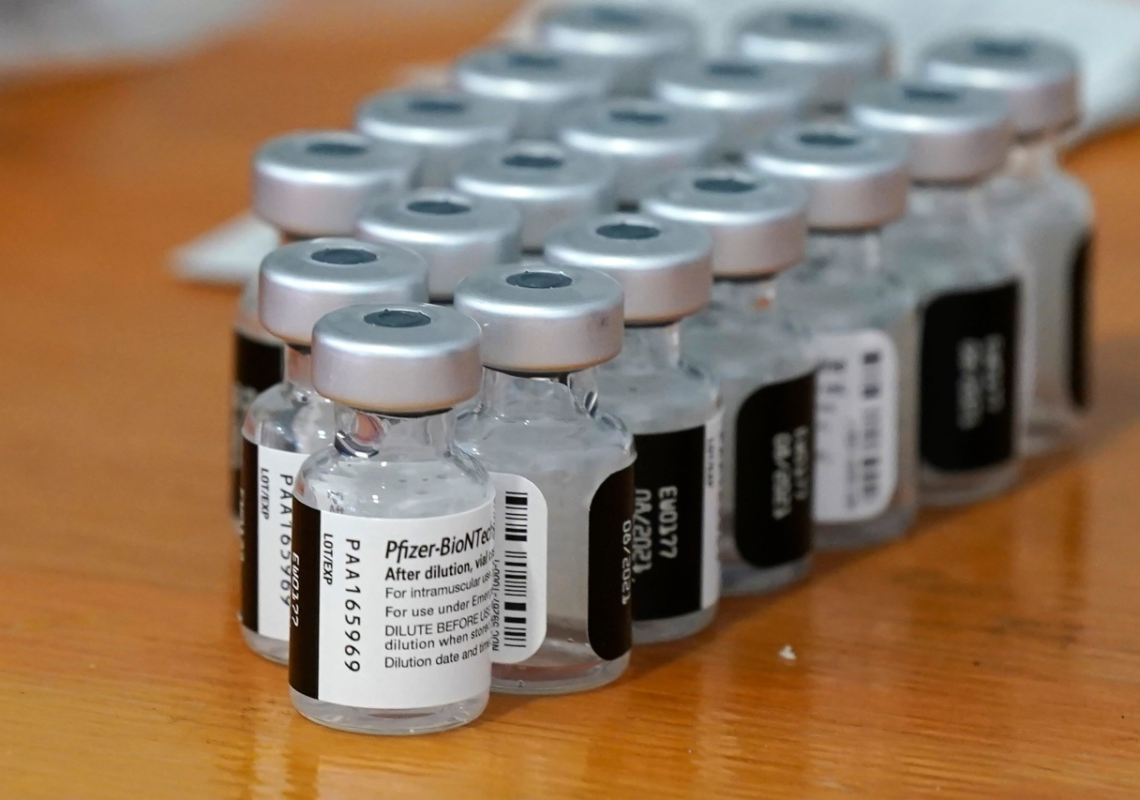KXAN Austin
by: Maggie Glynn, Monica Madden, Will DuPree, John Thomas, Josh Hinkle
AUSTIN (Nexstar) – Hospitals near capacity. Schools forced to close. Texas is still facing the fallout from the surge of COVID cases caused by the Omicron variant. But there are already efforts underway to help minimize the effects of future surges.
The Texas Department of State Health Services is offering financial help to organizations across the state that are willing to help promote the COVID vaccine in underserved and rural communities.
DSHS already awarded one round of grants last year, and the deadline to apply for the second round has been extended to Jan. 28, 2022.
The Texas Familias Council, based outside the Houston area, received part of that first round of funding.
“Since we’re working with local food banks, mental health organizations, and trying to get resources out into the community, it was just a natural fit for us to look at seeing how can we use the experience that we’ve gained, and maybe expand that into the community,” the group’s president, Maria Baños Jordan, explained.
For the past three months, the council has been distributing pamphlets in their area, urging more of their community to get vaccinated, and dispelling misinformation.
“With immigrant and Latino, Spanish-speaking communities, that can be a very, very difficult challenge to overcome, because they don’t have access to all the information at the time that you know, most English speakers do,” Jordan said.
The group has already been serving in their community for the past decade, which can help get through to those who are still hesitant.
“People want to have a trusted source,” Dr. David Lakey with the Texas Medical Association’s COVID-19 Task Force said. “We have to continue to try and get the right information out there.”
The Texas Familias Council is also spending the money to hire more volunteers to spread the word.
“Hiring community outreach educators that can spend that one on one time to sit down and talk with families or attend a PTA meeting, or go to a homeowner’s association meeting,” Jordan said.
They’re also hosting conveniently located vaccine clinics.
“Sometimes it’s not hesitancy, because because of any particular belief, it’s people have just put it off because they’re working very hard,” she said.
While new vaccinations are too late to curb the current omicron surge, doctors say it’s still crucial to fight future variants.
“There can easily be other variants that come our way. And just because you’ve had a mild case of it doesn’t mean that you’re protected. And doesn’t mean that you can’t transmit the next variant to somebody that you really, really care about,” Dr. Lakey said.
The grants range from $50,000 to $150,000.
Organizations can also qualify to apply if they focus on children, tribal nations, or are based in one of the 10 counties in Texas with the lowest vaccination rates.
For more information on how to apply, click here.
Austin voters will decide in May whether to decriminalize low-level marijuana offenses in the city. The group Ground Game Texas used the petition process to get the item on the ballot. If passed, the measure would prevent police from ticketing or arresting people for possessing small amounts of marijuana.
It’s a move you might expect, given Austin’s reputation for progressive politics. But similar ideas are also gaining traction with more conservative voters. Governor Greg Abbott highlighted that trend when answering a reporter’s question earlier this week at a campaign event in south Texas.
“One thing that that I believe in, and I believe the state legislature believes in, and that is prison and jail is a place for dangerous criminals who may harm others. And small possession of marijuana is not the type of violation that we want to stockpile jails with,” Abbott said at an event with law enforcement in Edinburg.
His statement reflects the views of a growing number of Texans who agree with policies to reduce penalties for marijuana possession. The Texas Politics Project at the University of Texas has been asking voters about their views on marijuana for more than a decade.
In 2010, their poll found 27-percent of Texans believed that marijuana should not be legal under any circumstances. When the poll asked the question again last summer, the number dropped to 13-percent of Texans.
But the poll found different levels of what Texans are willing to accept when it comes to looser marijuana laws. Just over a quarter of voters said that marijuana should be legal only for medical purposes, 31-percent believe possession of small amounts for any purpose should be legal, 29-percent support full legalization of marijuana.
Efforts to decriminalize or legalize marijuana face big roadblocks in the Texas Legislature. In 2019, the Texas House passed HB 63, a bill to reduce criminal penalties for possessing small amounts of pot. Lieutenant Governor Dan Patrick took to social media to declare the bill “dead in the Texas Senate” and voiced support for lawmakers who stood against reducing penalties for marijuana possession.
The bill did not advance. Similar legislation also died in the Texas Senate last session.
In the fall of 2021, Texas lawmakers passed sweeping changes to its election laws that are now one of the reasons why President Joe Biden is calling on Congress to pass voting rights legislation, to supersede some of these restrictions.
When Texas Democrats like Rep. Ron Reynolds took their fight to Washington D.C., it was largely a stalling tactic to prevent Republicans from passing Senate Bill 1, the elections overhaul bill. But it also drew the national spotlight to GOP-led state legislatures that have passed similar laws to the one in Texas.
“They’re doing things to make it more difficult. And they have a disparate impact among Black and brown people here in Texas,” Reynolds said. “The legislation that we passed is going to really make it more difficult to vote.”
Some of Texas’ changes squarely take aim at Harris County in the Houston area. In response to the COVID-19 pandemic, Harris County elections officials offered 24-hour polling places and drive-thru voting, which are now outlawed. The county also tried sending mail-in ballot applications to more than 2 million registered voters. Now, any Texas elections official who tries sending an application to someone who doesn’t request one could face criminal charges.
Republicans have hailed their changes as necessary for protecting election integrity and voters’ trust. Rep. James White, R-Hillister, said any federal legislation on this would be overreach.
“If you’re looking for trust in your elections you don’t want your elections run like the federal government,” he said.
If Biden’s calls for the Senate to pass voting rights legislation come to fruition, it could mean changes to Texas. Most notably, the federal package would mail-in voting access, which was restricted in the Lone Star State. Here are some of the proposals in the congressional legislation and how it would affect Texas:
In a 50-50 Senate with no Republican support, the federal legislation has a difficult path forward-facing an almost inevitable GOP filibuster. However, the president’s newfound support for ending the 60-vote threshold for voting rights bills is giving Democrats hope.
“This is what we wanted to see…the President use the bully pulpit to make the case of why it’s so important and vital to our democracy that we pass the John Lewis Voting Rights Act and the Freedom to Vote [Act],” Reynolds said. “Even if it means that we have to carve out an exception for the filibuster to pass it.”
Texas Congressman Kevin Brady, R-The Woodlands, dismissed Democrats’ reasoning for voting rights reform in an interview with the Washington Post Live on Wednesday. Brady is not seeking re-election once his term is completed.
“While we are dueling each other over imaginary claims of voter suppression, we ought to be focused on election integrity in a bipartisan way,” he said.
Dr. David Thomason, an associate professor of politics at St. Edwards University, said regardless of the outcome — the partisan fights over elections is already having a detrimental effect on voters.
“This is undercutting the trust in the democratic model of participation and voting participation,” he said. “It is going to take much more than a law in Congress to build the trust for either Republicans or Democrats.”
Growing mistrust in elections is something experts say has gained traction from former President Donald Trump’s repeated claims that the 2020 election was stolen. There is no evidence of widespread voter fraud in the 2020 election and it has been refuted by top election officials and judges throughout the country.
“This is a significant question that we will be dealing with all the way through the 2024 election…the extent that our voting laws are going to be fair and open for all candidates,” Thomason said. “A fair set of impartial rules to how we vote are vital to the integrity of the voting process.”
Elections coming up later this year in Texas will include some first-time candidates who all share one thing in common. Each of these women launched her campaign — seeking everything from the governorship to a seat on Austin City Council — after attending the same, relatively new program.
They all went through the LBJ Women’s Campaign School, a months-long bipartisan program housed within the LBJ School of Public Affairs at the University of Texas at Austin. Altogether, the first two campaign school cohorts included 120 women who enrolled with the ultimate intent to either become a candidate or a campaign manager. Joy Diaz chose the route of running for the highest office in Texas, launching her bid late last year for the Democratic gubernatorial nomination about a month after graduating from this program.
“I am here because, in the end, we’re going to make the state better. Texas deserves it,” Diaz said. “I truly believe that change is coming. Positive change is coming, and I want to be a part of that.”
Diaz, a former Texas Public Radio journalist, described learning about the LBJ Women’s Campaign School as just one in a series of “miraculous events” that led her to leave her job and jump into politics. She said she began thinking about a new path after she and her young son survived a COVID-19 infection before they could get the vaccine.
“For us, it was one of those things where we couldn’t breathe,” Diaz said. “It taught me that I have to live life with no regrets — and that if the state of Texas needed a champion, and I wanted to be that champion, that I should jump in the ring and say, ‘I think Texans are worth it.’”
With those thoughts circulating in her mind, a news release asking for coverage about the application period opening for a new class of the LBJ Women’s Campaign School landed in her reporter inbox seemingly at the right time.
“It was serendipitous,” Diaz said about that email. “I think this is a message for me. This is a place where I can grow and develop and find like-minded people, and like-minded people doesn’t mean party affiliation because it’s a bipartisan school. Learning from and cross-pollinating from a variety of mindsets was very enriching.”
Training the next generation of elected leaders to start down that path inspired Amy Kroll to create the program. She said she brought forward the idea while starting her master’s degree at UT Austin and noticing the political activism among women erupting in 2018.
“Women were engaging in their democracy in record numbers. They were reaching out to their members of Congress. They were running for office in record numbers, and people were calling that the ‘year of the woman,’” Kroll said. “I saw all of that happening, and I knew that there was this opportunity to get more women elected into public office.”
The first cohort of the LBJ Women’s Campaign School, which included 50 women from across the U.S., launched in January 2020. Then, 70 more women joined the program’s second cohort in April 2021. Now, almost two years after the campaign school began, 11 graduates have launched campaigns of their own — in Texas, Arkansas and Maryland.
“I feel so incredibly proud of these women,” Kroll said. “I always love the quote from Eleanor Roosevelt where she says, ‘You must do the thing you think you cannot do.’ These women are really stepping into the arena. They are doing the thing.”
The latest numbers published by the U.S. Census Bureau showed that women make up 50.3%, a slight majority, of the Texas population. However, they remain a minority in the share of elected leaders statewide, though numbers are trending upward.
The Center for American Women and Politics at Rutgers University took a look at the current numbers. The center found that women hold seven of the 38 Congressional seats in Texas. Meanwhile, women fill 48 of the 181 seats (26.5%) in the state legislature — the most in the center’s database going back to 1975. Outside of the state’s judicial positions, only one woman currently holds a statewide elected office: Texas Railroad Commissioner Christi Craddick.
Here in Austin, Stephanie Bazan announced a run to represent District 5 on city council. She did so after going through the campaign school. She applied for the program after hearing about two of her friends’ experiences in the first cohort.
“I just thought this would be a way for me to get some more tools in my toolbox,” Bazan explained. “I really like to be prepared before starting anything and get everything organized and together. This felt like a good piece for me to move forward.”
In addition to learning things like the need to apply for a campaign treasurer to officially set the groundwork for a campaign, Bazan said all the information she got about raising money proved most helpful.
“Fundraising is hard for a lot of folks,” Bazan said. “Through Women’s Campaign School, I was able to get some tips and tools about how to go about that — what to do for call time; how focused you really need to be about fundraising; and how to bring your whole family and circle of friends into that to make it fun.”
In one primary approaching in March, two campaign school graduates will face each other to become the Democratic nominee for Travis County’s 261st Civil District Court judge. Pam Davis and Daniella Deseta Lyttle, the two candidates in this judicial primary, are both attorneys in Austin who credit disapproval with actions taken by the Trump administration for fueling their desires to seek elected office.
“It was a time where I had to be very creative and innovative to protect my clients, and it was a time that really told me that what we needed was systemic change at a higher level, where people can go into a court of law and feel seen,” Deseta Lyttle said. “No matter how you look at it, the reality is that when judges have shared lived experiences with the people that end up going before the court, I think the results are better.”
“I basically said, ‘Enough is enough,’” Davis explained. “I have this experience. Now is the time for me to use my experience on a — I guess you would say — just a different platform because I’ve always wanted to serve, and I felt like now was the perfect opportunity to move forward.”
Both women said the campaign school helped with tangible skills, like sharpening their stump speeches, teaching them about political organizing and how to maximize votes. However, the more abstract benefits came from the connections they made with the other women in the program and building up confidence that they have what it takes to dive into the sometimes slimy pool of politics.
“One of the things we learned is that women normally have to be asked several times before they ever venture out into the field of politics, whereas a man, they just jump out,” Davis said. “It’s really good to have a program that will help you build your confidence; to know that your voice matters; that diversity matters; that you have something to offer.”
“The number one thing that I learned from it is that it’s possible — you can do this,” Deseta Lyttle said. “Just being surrounded by positive women who were encouraging and made it seem like, or feel like, a dream could be a reality, it was really the most helpful part of all of it.”
As founder and executive director of the campaign school, Kroll said everyone leading the program is specifically interested in and tracking how going through the school affects the participants’ confidence levels. She pointed out a survey taken after the first cohort graduated showed that 100% of the women said the program helped to increase their confidence to reach their career goals.
“Some of the different ways that we do this is through building the skills of the women through helping them see that they can do it — by introducing them to mentors, by showing them role models, by bringing women into the classroom who have been successful,” Kroll said. “And then also through building that sisterhood of support. I think you feel a lot more confident, and like you can do it, when you see your friends, other people in the cohort, making that change, making that difference.”
Other campaign school graduates running for office this year include the following:
In 2021 two graduates won offices that they sought. Jaynie Schultz now sits on the Dallas City Council, and Jessica Davila-Burnett won a seat on the Boerne ISD school board.
If someone is interested in enrolling in the LBJ Women’s Campaign School, Kroll broke down what they’d learn through the program. She explained the campaign school has three main pillars: classroom learning, mentorship and networking.
The classroom component, she said, included teaching different campaigns skills. Those include everything from fundraising and talking to the media to grassroots organizing and stakeholder engagement.
“Every possible campaign skill that you can think of, we are covering as part of our curriculum,” Kroll said, “so that the women feel really confident when they do enter the political arena, that they’ve at least had some exposure to every type of political campaigning.”
Each woman enrolled in the program is also partnered with a mentor. Kroll said half of these mentors are either current or former elected leaders. They’ll provide tailored support, she said, so that the women have another sounding board to figure out the next steps in their career.
Bazan, the Austin City Council candidate, said the program paired her with someone who currently works at City Hall. She said that mentor shared some invaluable advice about how to better engage with the community.
“One of the things she said is, ‘It’s okay to be out there and be assertive and to tell people more about what you’re doing.’ They want to hear that,” Bazan said. “That was a helpful little nugget that I got.”
Additionally, the campaign school focuses on building relationships among the participants themselves so that they support each other during — and after — the program. That’s what the women now running for office all mentioned as one of the best takeaways.
“The connections that were built through this virtual space were priceless and something that I didn’t realize that I would get above and beyond all of the technical knowledge and exposure to other politicians,” Bazan said.
“I think that women in general, as a whole, we are connectors, and we are naturally that way,” DeSeta Lyttle said. “If we reach out to other women in the community and say, ‘This is my dream,’ my experience has been that many will lend a hand and say, ‘Well, let me tell you how I think you can get there.’ Then, you accumulate all of those little tips, and you get out there and you make it happen.”
“That sisterhood is something that I think we will all continue with throughout [our careers],” Davis said.
Copyright 2022 Nexstar Media Inc. All rights reserved. This material may not be published, broadcast, rewritten, or redistributed.
CALDWELL COUNTY, Texas (KXAN) — More than one year since Texas State student Jason Landry disappeared, the Caldwell County Sheriff’s Office is releasing new evidence in the case.
And they’re hoping it will catch the attention of the office of Attorney General Ken Paxton.
AUSTIN (KXAN) — Managing the surge in COVID-19 cases on college campuses is a top concern for educators, parents and students.
The University of Texas at Austin and Texas State are set to resume classes this week — many of them will be virtual for the time being.
ARLINGTON, Texas (KXAN) — A video on social media showed fans throwing bottles and debris toward the NFL officiating crew who worked the Dallas Cowboys’ 23-17 wild card playoff round loss to San Francisco Sunday.
The video shows several pieces of trash flying from the stands as officials ran into the tunnel just moments after Cowboys quarterback Dak Prescott came up short on a potential, game-winning drive at the end of the fourth quarter. Defensive lineman Demarcus Lawrence used his helmet to block an object that came flying toward him from the crowd.






